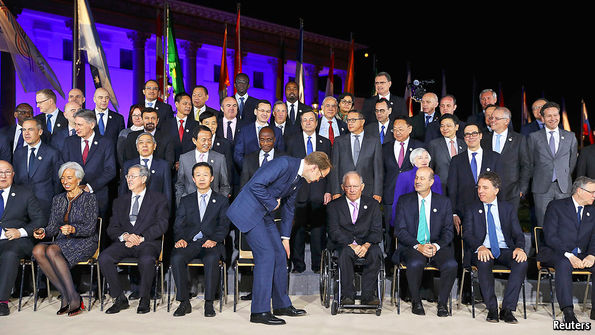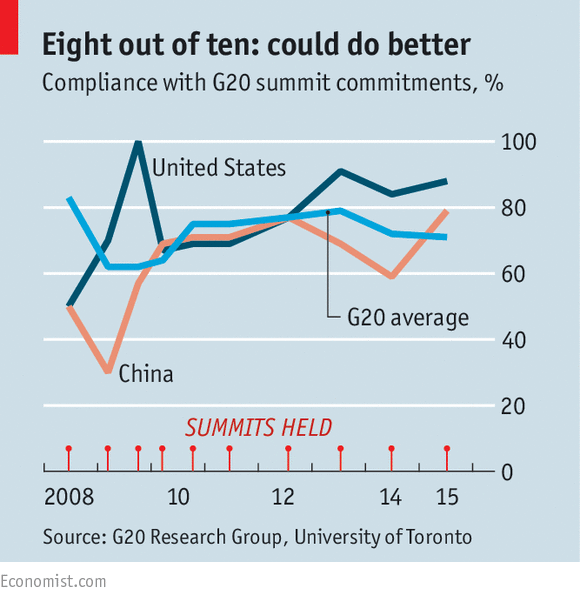China’s growing clout in international economic affairs
As America retreats, China advances
Mar 23rd 2017| HONG KONG
THE IMF “systematically impoverishes foreigners”, and the World Bank’s advice has “negative value to its best clients”. These harsh words were voiced not by lefty critics of the Washington Consensus, but by two men (David Malpass and Adam Lerrick, respectively) whom Donald Trump has picked to lead his Treasury’s dealings with the rest of the world, including the international financial institutions (IFIs), such as the World Bank and IMF, and the G20 group of leading economies.
Their future boss, Steven Mnuchin, America’s treasury secretary, is not much more reassuring to the global financial establishment. At his first G20 meeting, in Baden-Baden in Germany on March 17th-18th (pictured), he vetoed a long-standing pledge to “resist all forms of protectionism”. It had often been breached. But hypocrisy is the tribute vice pays to virtue.
To veterans of international economic affairs, this combative stance is baffling. America’s government now seems to disdain a set of institutions it nurtured into life—institutions that are more commonly criticised for following America’s will too closely. “The United States is just handing the leadership over to China of the multilateral system,” Jeffrey Sachs of Columbia University told Bloomberg this week.
But if there is a vacancy, is China qualified or even interested in the job? In January President Xi Jinping seemed to audition for the role in a speech praising globalisation at the World Economic Forum in Davos, Switzerland. As evidence of its capabilities, China can also point to a hefty portfolio of chequebook diplomacy. The China Development Bank, one of its policy lenders, already has a bigger book of overseas assets than the World Bank. Another institution, the Export-Import Bank of China, is not far behind. In addition, the country’s central bank has extended currency-swap lines to over 30 countries, including many that America’s Federal Reserve would not touch.
What about its willingness? Most of China’s economic diplomacy to date has been bilateral, allowing it to win loyalty, reward friends and secure contracts for its companies. Over 60 countries will, for example, supposedly benefit from Mr Xi’s nostalgic vision of a revived Silk Road (the “Silk Road Economic Belt and 21st Century Maritime Silk Road”, mercifully shortened to “One Belt, One Road”, or OBOR).
As for multilateral efforts, China’s most eye-catching initiatives have worked around the existing system, not through it. It set up two multilateral lenders of its own, the New Development Bank (known as the BRICS bank, based in Shanghai, with financial contributions from Brazil, Russia, India and South Africa as well as itself), and the Asian Infrastructure Investment Bank (AIIB), in Beijing, which just increased its membership to 70, including every G7 country except Japan and America.
So it might seem that China has little interest in filling any gaps America might leave in the old multilateral system. But that would ignore another, less heralded trend. Overshadowed by its bilateral boondoggles and multilateral innovations, China’s relationship with the incumbent IFIs has been warming. It has become more “compliant” with G20 commitments, according to the G20 Research Group at the University of Toronto (see chart). Its currency is now more fairly valued and its current-account surplus has narrowed, removing a bone of contention with the IMF.
The IMF’s decision in 2015 to include the yuan as one of five reserve currencies in its Special Drawing Rights basket has also helped to rebut the notion that the fund is an arm of an American policy of containment. Moreover, since China’s ham-fisted devaluation earlier that year, it has often sought the IMF’s advice on managing the transition to a more flexible yuan and communicating its policy to the markets.
China is similarly happy to learn what it can from the World Bank, which has advised it on everything from managing the debt of its provinces to cleaning the air in its cities. The bank’s suggestions are not always taken. But at least China seems to value its advice non-negatively.
China’s relationship with these institutions is also becoming more generous. It is now the 11th-biggest donor to the International Development Association (IDA), the arm of the World Bank that helps the world’s poorest countries. The China Development Bank has co-financed several World Bank projects in Africa.
Last autumn, when the IMF was looking for money to help Egypt, it phoned China, which agreed to extend a currency-swap line worth 18bn yuan ($2.6bn). The call took only five minutes and China’s generosity embarrassed the G7 into stumping up some money in addition. China had been similarly helpful to the IMF bail-out of Ukraine a year earlier.
The World Bank and the IMF are imperfect vehicles for China’s economic diplomacy. The bank’s capital constraints might inhibit a big expansion in its lending and China’s voting power and financial stake in the IMF will rise only if America permits. It took Congress six years to approve the last reform and it is hard to imagine the next round, due in 2019, winning much support from Mr Trump. But by adding extra dollops of financing to favoured bank and fund programmes, China can nonetheless steer the multilateral system indirectly, by adding its weight where it sees fit.
In the long term, if China becomes the world’s leading economy, it is conceivable it will become the biggest financial contributor to the bank and the fund. At that point, according to their articles of agreement, their headquarters would have to decamp to China. All the more reason for the World Bank to help Beijing clean its air.


